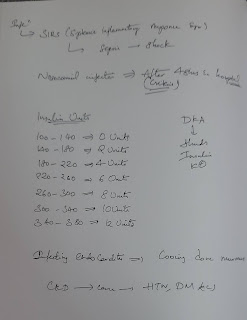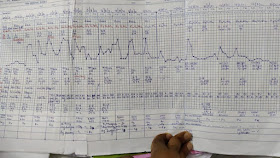paraperesis 2
General medicine case study
Roll no 43
I was given a paraperesis
Cheif complaints
Difficulty in climbing stairs since one month
Bilateral lower limb weakness since one month
Difficulty in holding cheppal
Wasting and thinning of lower limb muscles more than upper limb
No history showing sensory involvement
No history showing involuntary movements
Cerebral invovment based history was not there
So my diffrentials concised to UMN or LMN lesion
On examination
On examination we find
Normal grneral examination
Hemogram , serum electrolysis , other lab investigations wer normal
Thyroid tests were normal
CNS examination showed
Atophy
Hypotonia
Absent deep tendon reflex
Babinski sign negative
This confines my diagnosis to LMN lesion
Lesion of LMN can be located at four places on its pathway
Anterior horn cell
Peripheral nerve
NMJ
Muscle (myopathy)
To rule out Anterior horn cell disease and peripheral neuropathy , evaluation of conduction velocity (NCV), histological findings , biochemical studies are necessary.
NCV testing has to be done in the patient , which helps us to know whether it is neurogenic.
ELECTROMYOGRAPHY is done and showing normal results , from which we can rule out NMJ disorders.
Since in case motorin involvment is predominantly seen
Diagnose confined to
Myopathy
Peripheral neuropathy
To specify
As they wer conducted thyroid tests and wer normal HYPOTHYROIDISM can be ruled out
So being myopathy is highly not possible
Might be
Peripheral neuropathy
Treatment
Effective prognosis and treatment of peripheral neuropathy relies heavily on the cause of the nerve damage. For example, a peripheral neuropathy caused by a vitamin deficiency can be treated -- even reversed -- with vitamin therapy and an improved diet. Likewise, nerve damage brought on by alcohol abuse can often be stopped and improved by avoiding alcohol. Peripheral neuropathy caused by toxic substances or medications can often be corrected in much the same way. When neuropathy is related to diabetes, careful monitoring of blood sugar levels may slow its progression and curb symptoms.
Early diagnosis and treatment of peripheral neuropathy is important, because the peripheral nerves have a limited capacity to regenerate, and treatment may only stop the progression -- not reverse damage. If you have become severely impaired, you may need physical therapy to help retain strength and avoid



Comments
Post a Comment